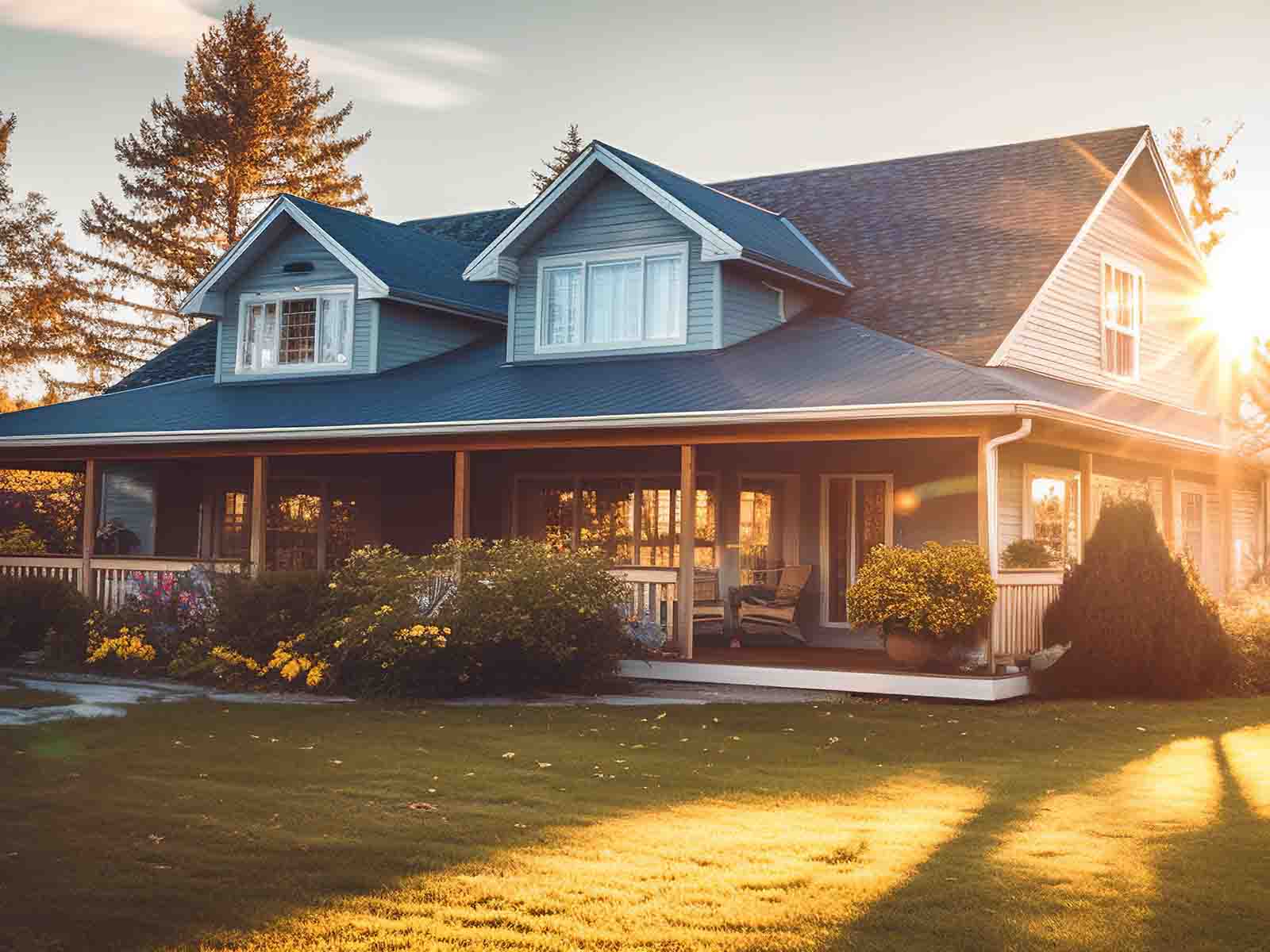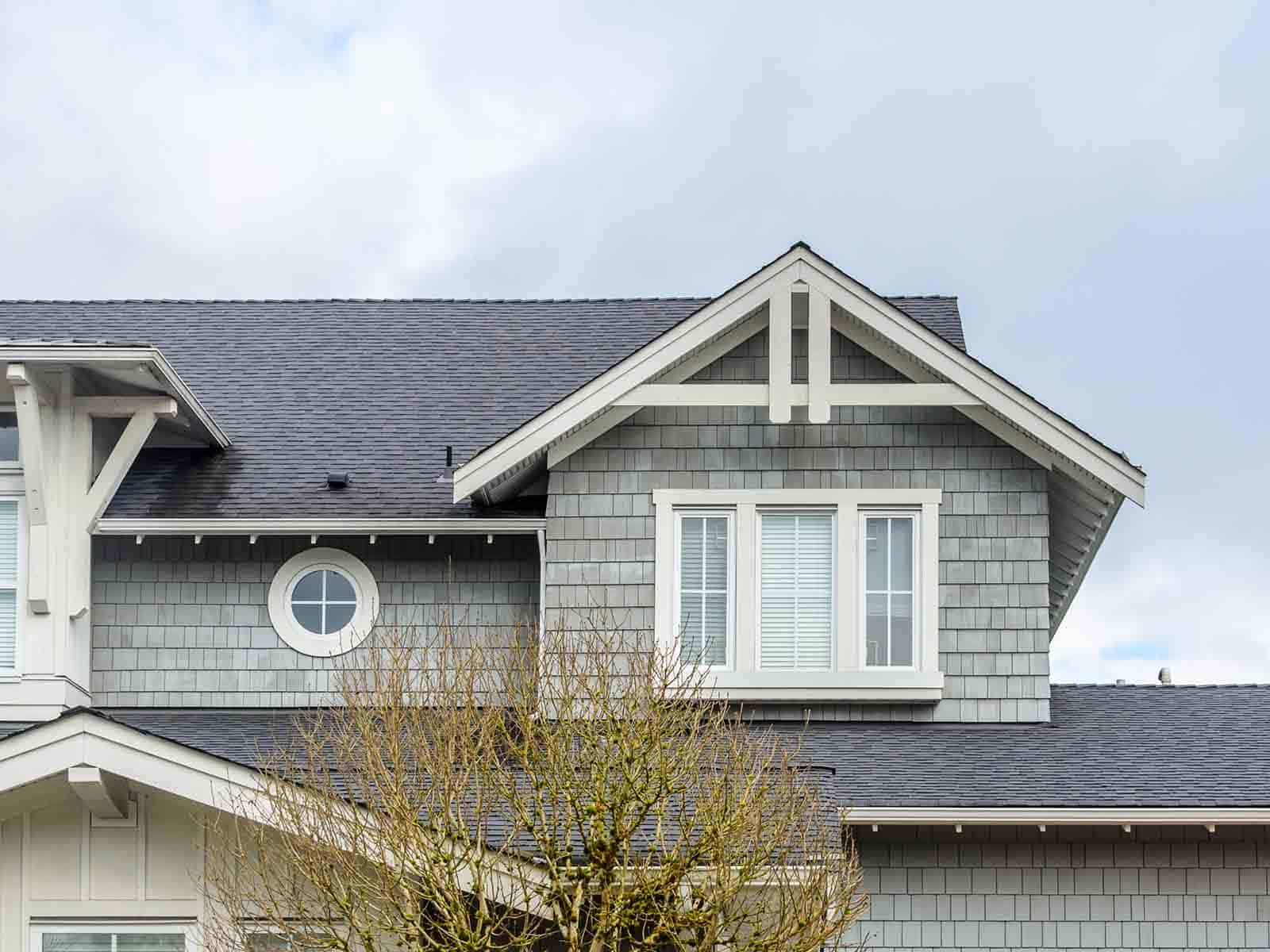The Cost of a New Roof
Several factors can significantly influence the cost of a roof repair and roof replacement in Richmond, VA, making it essential for homeowners to understand these variables before embarking on such a project.
Roof replacement costs are influenced by several key factors such as:
- Size and complexity of the roof are crucial; larger and steeper roofs demand more materials and skilled labor, increasing costs.
- Material choice also significantly affects pricing, with a range of options from affordable to premium.
- The existing roof’s condition is important too; underlying damage can necessitate additional repairs, adding to the expense.
- Seasonal factors and local market conditions, including regulations and labor availability, can impact overall costs.
While a smaller roof repair is less expensive than a roof replacement, you may not be able to get away with simple repairs if your roof is significantly damaged. Homeowners should carefully consider each of these factors and obtain an accurate quote from a reputable roofing contractor like SlopePro to make informed decisions about their upcoming roof replacement project.
Financing Loan Options for Roof Repairs or Replacement
We understand that oftentimes, you’re unprepared to take on a large roofing project. We offer in-house financing with over 40 types of loan options available so you can choose the one that works best for you. Hear more about SlopePro’s financing options below.
Jump Ahead
Roof Size and Pitch
The size, pitch, and slope of a roof directly impact the cost of replacement. Steeper roofs require more safety measures, specialized equipment, and labor, leading to higher expenses. The roof’s steepness also influences material choices; for instance, steep roofs may need more wind-resistant materials like metal roofing or clay tiles, which are costlier and might need extra structural support. Homeowners should be aware that steep or complex roofs entail additional costs and seek experienced professionals for accurate assessments and safe installations. Typically, roof measurements and pitch analysis are part of a professional’s inspection, so homeowners don’t need to measure these themselves.
Roofing Material and Quality
The lifespan of a roof depends on its material. Commonly used asphalt shingles last 15-30 years, while durable metal roofs can last up to 40 years. When replacing a roof, considering longer-lasting materials like metal, wood shakes, or tile roofing can be beneficial. Higher-quality materials cost more but offer greater longevity and weather resistance. Climate also plays a role; for example, metal roofing is ideal in hot climates due to its heat-reflective properties. Homeowners should balance their budget, location-specific needs, and aesthetic preferences when choosing roofing materials.
Roofing Layers
Building codes often set a limit on the number of roofing layers permissible. Exceeding this limit requires removing all existing layers before installing a new roof. This removal is labor-intensive and costly, involving significant time, effort, and disposal fees, especially if the roof has multiple layers or if prior installations were flawed. The process becomes more complex and expensive with each additional layer. Furthermore, the disposal of roofing debris, usually at a landfill, incurs additional fees, which rise with the amount of material removed. This factor is particularly relevant for older homes with multiple past roof replacements but is less of a concern for newer homes or those with fewer past roofing changes.
Roofing Accessories
Roofing accessories, including underlayment, ridge vents, chimneys, and flashing, significantly influence the functionality, aesthetic, and cost of a roof replacement. Their installation adds complexity and expense, especially for items requiring specialized expertise like chimneys and ridge vents. Proper sealing and ventilation are crucial, and the choice of high-quality materials for these accessories can further raise costs. Compatibility with the roofing material is also essential, as different materials require specific accessories for optimal performance. Homeowners should factor in these accessories’ necessity and compatibility when planning their budget for a roof replacement.
Roofing Features
Unique roof features like skylights, dormers, and complex rooflines require extra work and materials, impacting the cost. Skylights demand precise installation for leak prevention and proper insulation, involving cutting into the roof, framing, and flashing. Dormers, protruding from the roof, need complex framing and integration with the existing roof. These features increase costs due to the added labor and material for a durable and visually appealing finish. Repairs or replacements of these features, especially if custom or unique, further raise the project’s cost. However, their inclusion in a roof replacement depends on individual aesthetic preferences and is not a standard requirement.
Roofing Warranty
The type and length of warranty offered by the roofing manufacturer and the contractor can also influence pricing. Roofing materials often come with manufacturer warranties that cover defects and, in some cases, the cost of replacement materials. Opting for high-quality materials with extensive warranties might initially increase the upfront cost of the project, but it can save money in the long run by providing added protection and reducing the likelihood of premature replacement.
Many roofing contractors offer workmanship warranties that guarantee the quality of their installation and labor. SlopePro offers a Lifetime Guarantee, matching our workmanship warranty to the material warranty of your new roof.
Some roofing warranties may require regular inspections and maintenance to remain valid. Investing in routine roof maintenance as per warranty requirements can extend the lifespan of the roof, reducing the chances of premature replacement and saving costs in the long term. Neglecting these obligations might void the warranty, leaving homeowners solely responsible for any repairs or replacements, which can be a substantial financial burden.
You should always carefully review the warranties offered by both the manufacturer and the roofing contractor. Understanding the terms and coverage of these warranties is essential for making informed decisions about your warranty needs.
Roofing Timeline
We understand that emergencies happen. If you’ve experienced sudden roof storm damage that is causing significant roof leaks or greater structural damage, your replacement project needs to get started as quickly as possible.
However, the urgency of the project may affect pricing. Even if contractors are available when needed immediately, a rush job requires precise work on a shorter timeline. Increased work hours or additional contractors working on the roof naturally lead to greater labor costs for the project. If it’s a season where demand is high and contractors are not so easily dispatched to your home, that can also incur greater costs, as work needs to be realigned to get your job done.
Material availability is another necessity to consider in a rush job. If your requested materials need to be ordered or customized for your roof, that will have to be expedited to meet your ideal timeline. Rest assured that quality and workmanship are not compromised in a rush job with SlopePro, but it will likely lead to increased labor charges, especially.
Additional Damage
If there is damage to the roof deck, insulation, or other structural issues underneath the roof’s top layer, these may need to be addressed. A proper inspection can uncover these issues or reassure you that you have none.
Removal of layers, as discussed above, can reveal underlying issues in the roof deck or structure, such as rot or damage. Repairing or reinforcing the roof deck adds extra costs to the project, making the overall replacement more expensive. Addressing these problems before installing the new roof is essential for the integrity and longevity of the replacement.
Permits and Regulations
Local building permits and regulations may require fees and affect the project’s cost. For example, if you’re the owner of a historic home in Virginia, there are likely approval processes you must go through with historical societies, HOAs, or local government associations. There may be application fees or other costs in order to begin work on your roof.
SlopePro will work closely with you to examine any necessary permits or regulatory approvals for your project.
Seasonal Factors
Seasonality has a big impact on the roofing industry. Roofing contractors often experience fluctuating workloads based on weather conditions, leading to varying prices for their services throughout the year. Demand for roof replacements tends to peak during milder weather, such as spring and summer, when homeowners are more likely to undertake renovation projects. During these peak seasons, contractors are busier, which can lead to higher labor costs as they capitalize on the increased demand.
For this reason, it’s a misconception that you should not repair or replace your roof in the fall or winter, as it may actually come at a lower cost to you. During these periods, contractors are often looking for work, and they may offer discounts or lower labor rates to attract customers.
Insurance and Financing
The method of payment for a roof replacement can significantly affect the overall out-of-pocket cost. Homeowners have options such as making a full payment upfront, utilizing insurance coverage, or choosing financing options.
Insurance policies often cover roof replacements due to damage from specific events, but terms and coverage limits vary, making it crucial to review policies carefully. Adequate coverage can substantially reduce direct expenses, particularly in severe weather-prone areas.
Financing, through loans or credit, offers an alternative by spreading the cost over time. The total expense may increase due to interest rates and repayment periods, but monthly payments become more manageable. SlopePro provides roof financing with rates starting at $97/month, including different term lengths and interest-free options.
Selecting a reputable roofing contractor is also vital. SlopePro, known for its high-quality work, is fully licensed and insured, a standard not universal among roofing companies. Opting for a trusted contractor ensures quality workmanship that meets insurance criteria, preventing future costs from inadequate or uninsured work.
Contact SlopePro For a Free Inspection and Quote
SlopePro is a trustworthy roofing contractor when it comes to providing honest and accurate estimates. We perform complimentary inspections that follow a Forensic strategy, giving you a clear and comprehensive picture of your roof’s needs.
To schedule your free online roof inspection, utilize our SlopePro Roof Estimator or call 804) 585-3141. We’ll work with you to discuss your material and pricing options so you feel confident in your roofing project with SlopePro.


